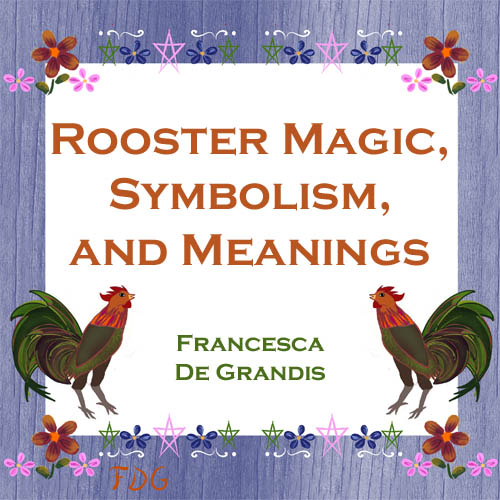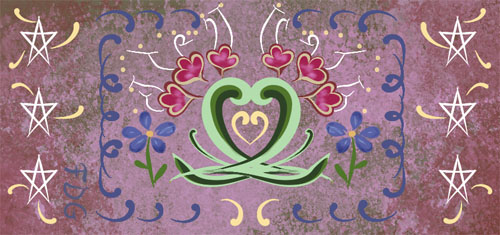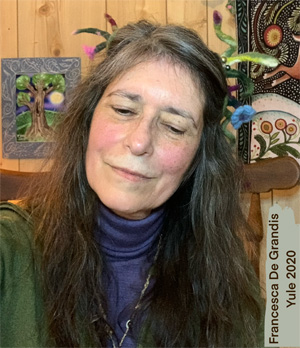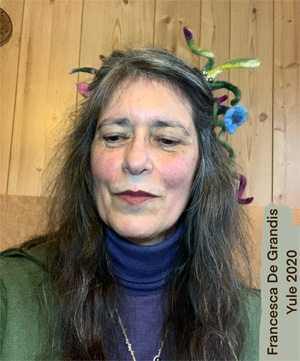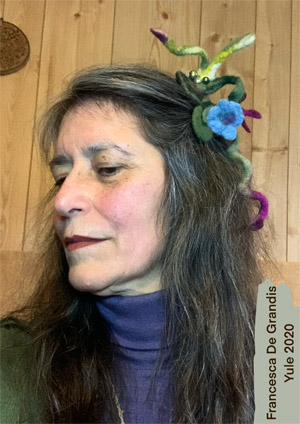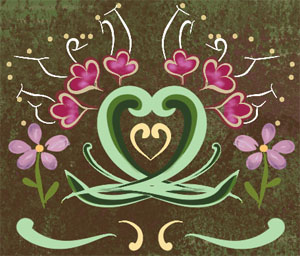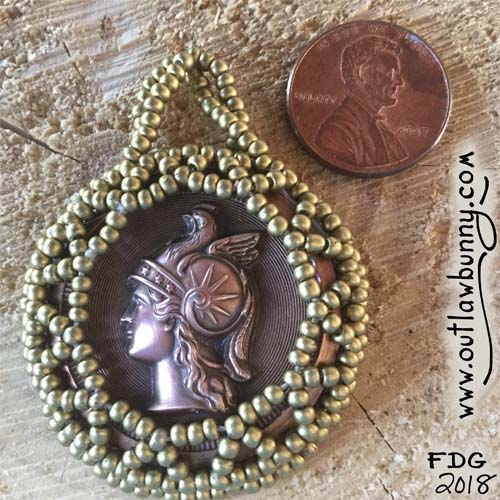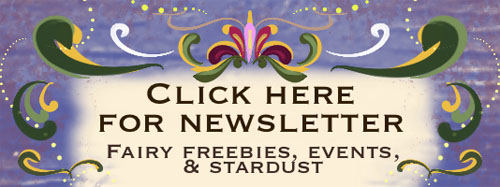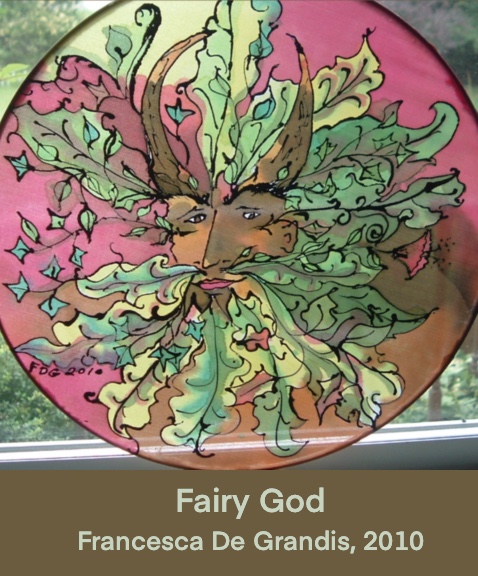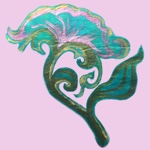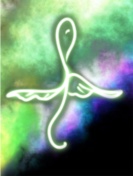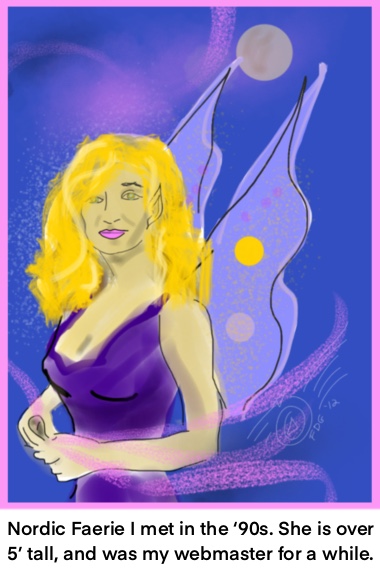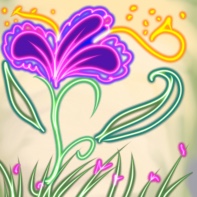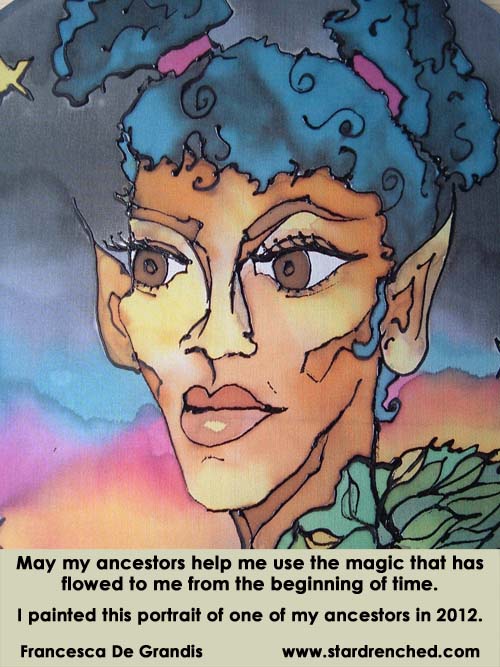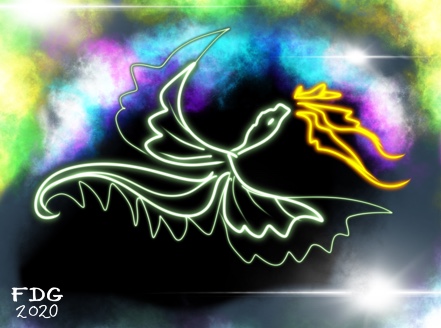Rooster Magic, Symbolism, and Meanings
What Is Rooster Magic? What does Rooster Symbolize?
Rooster is a symbol of joy, vitality, inner fire, passion for life, healthy pride in your accomplishments, and fun.
Thus, rooster magic creates all those blessings, and I’ll show you how to do rooster magic in a sec, yay!
What Is the Meaning of Rooster?
If a rooster appears in your dream, or rooster pics are showing up an inordinate amount in your online newsfeed, here are ways you might interpret that symbolism.
1) It could mean that you need to find more joy, healthy cockiness (heh, accidental pun there— cockiness), self-respect, or any of the other things I mentioned roosters symbolizing.
2) On the other hand, it could be the universe affirming your lust for life, fire, or other rooster-like traits, so that you know you’re on the right track.
3) Or both messages could be present: a confirmation of your fabulous rooster self, with an urging to strengthen those traits.
With three options to choose from, it can be confusing. Go with your gut. But then confirm with a friend who is a straight-talker, so you don’t fool yourself.
How to Do Rooster Magic
Try any or all of these:
* Place a picture or statue of a rooster in your home and/or workplace. This totem—or call it a fetish—attracts rooster powers into a space.
* Contemplate a picture or statue of a rooster for five minutes. You needn’t study the totem with a sharp focus or intellectually analyze it. Rest your attention on the rooster the way your head rests on a pillow at night. Try for relaxed attention and gently note what you experience, whether an idea, feeling of empowerment, peace, or anything else. There’s no right or wrong here. If you experience nothing, it doesn’t mean you’re not receiving rooster power. You may not notice it yet. If you have a tiny positive experience, that could be the tip of the iceberg, the rest of the improvement occurring during the contemplation or after it.
* Crow like a rooster when you wake in the morning. Sounds silly, but it plugs you into rooster energy and helps it flow through you, empowering you for the day ahead.
* Strut around like a rooster. If the silliness of it makes you laugh, that’s great. Laughter is medicine that heals and uplifts the spirit. And fairies, drawn to the merriment, will add to your power.
* Wear jewelry with a rooster picture on it. The jewelry functions as an amulet.
* Let’s not forget actually raising a rooster and hens as an option. In a world where the abstract or symbolic are often considered more powerful than the actual items being symbolized or discussed, it’s important to remember having a real rooster in your yard would be powerful rooster medicine.
* If a deity in your pantheon likes roosters, put a photo or sculpture of a rooster on your altar and tell your God it’s for them. Three Gods partial to roosters:
I Learn Rooster Magic
I didn’t pay attention to rooster magic until fairly recently. Then I saw a beautiful stone pendant carved as a rooster. I just had to have it, even though till then I’d usually found the plethora of rooster decor annoying.
When I received the carving, I knew Exu would love it.
African God Exu and Roosters
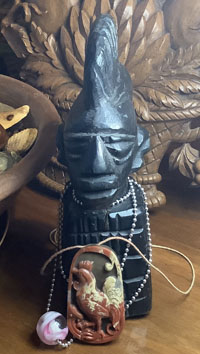 Exu is one of the African Pagan Gods. He embodies enormous vitality, fire, confidence, and love of life. He bestows those traits on those devoted to Him.
Exu is one of the African Pagan Gods. He embodies enormous vitality, fire, confidence, and love of life. He bestows those traits on those devoted to Him.
He is a major figure in my pantheon and takes good care of me.
I had to laugh when I was putting the finishing touches on this essay and happened to see the following Yule 2020 photographs. They show me wearing fascinators (tiny hats) I designed and made.
Usually you wear only one fascinator, but I wore three. They don’t look like hats but like flowers and hornlike flora growing from my head, and the three work well together.
Anyway, I laughed with delight and happiness—not self-denigrating mockery—because, in the photos, I might as well have been strutting around a barnyard! I look so pleased with myself and happy, full of life at age 70, proud of my wild whimsical designs, and relishing the abundance of hair ornamentation that adorned my crown for the Yule ceremony that was about to happen, and Exu fosters all these traits.
In other words, I laughed to stumble across photographs that show me an utter and happy rooster-like example of my above remark that Exu bestows certain traits:
I’d never seen any lore about Exu and roosters, but He told me He’d like to wear my new pendant. I draped it over a statue of Him. In the process, I sensed that rooster holds some of Exu’s powers, which is how I learned and became enamored by the magics of rooster. … In retrospect, they’re self-evident.
When I researched Exu and roosters, still nothing. But I believed He loves them nonetheless. My belief was corroborated when I happened to learn the God Mercury likes roosters.
Roman God Mercury and Roosters
Mercury is one of the Roman Pagan Gods. His affection for roosters makes sense to me. Exu and Mercury have so many similarities that they’re beyond the confines of this post. But both Deities have a sense of humor, lust for life, fire, and out-of-bounds exuberance. I know either of them would exclaim, “Cock-a-doo·dle-doo” with great gusto, luscious pride, and yummy silliness.
An exception to my ignoring rooster magic before my experience with Exu and the pendant:
Goddess Athena and Roosters
Athena is one of the Greek Pagan Gods. I love this Goddess Warrior Mother Who protects and upholds me. I saw a wee portrait of Her online that I purchased:
The wee gold-tone spheres around Her portrait are not part of the piece I purchased. I beaded a setting from gold-colored seed beads, to hang the portrait from a cord around my neck.
Who wouldn’t want a portrait of Athena with a rooster on Her head, LOL!? So I did some online research to discover She likes roosters. Then I forgot that Athena pendant and the related research, until after I had the rooster experience with Exu, made up ways to do rooster magic, and created a jointed paper rooster doll as one of those ways:
Jointed Paper Doll of a Rooster
I love making jointed paper dolls and channeling sacred art. Combining the two is the best experience for me. Making a jointed, paper-doll rooster was a way to learn more about rooster power and drink it into my cells. A video of the rooster doll I made:
If I spoke too softly at the end of the video, here’s what I said: “Magic is in everything. The magic rooster, my magic hands, your magic nose, my magic toes.” Hahahahaha.
Have a Rooster Totem in Your Home
An exclusive for my newsletter subscribers: in an upcoming newsletter, I’ll gift subscribers a PDF painting of the doll’s parts. You can print and cut out the parts, to assemble your own jointed, paper doll rooster. Click the banner below to subscribe.

